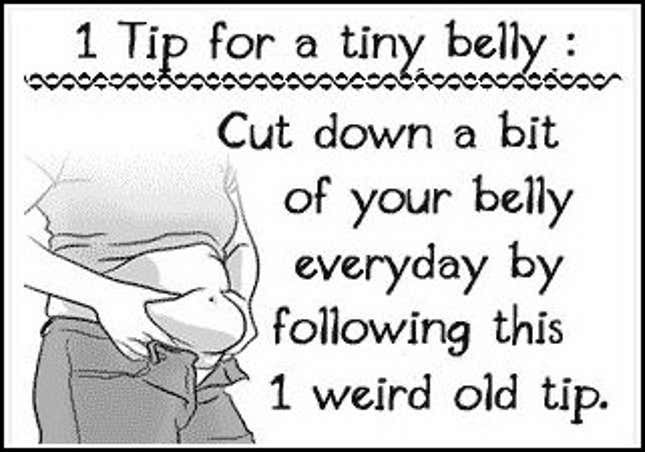Around the turn of the century, the internet began solving our problems with “One Weird Trick.” Fifteen years later, most of us shun such snake oil; we accept that our belly fat cannot be shed in a week, and that the upkeep of a desired weight requires lifelong vigilance.

The internet’s answers to complex questions like hair loss, illness, and weight gain were so hilariously simple our faith in them could not be sustained. But our faith in easy results or hacks did not disappear. Instead, it largely departed from the human body and took firmer root in the social one.
We have come to think of the world less as a social body and more as a collection of individual organs. When we perceive ourselves as unconnected within a social body—which continues to exist, despite the long denial of it—snake oil is an easier sell.
We may still be tempted to try a little dietary cheat. Even so, we are aware that a bigger dietary theory is what will keep us from busting our pants. When we talk about our bodies now, we use terms like “wellbeing” to describe their complex nature, or “maintenance” to describe their care. The idea of the body as a system is one we embrace. But, we have largely come to reject any idea of society as an integrated system to be carefully maintained. The problem is that society keeps on stubbornly behaving as a system, despite our new faith.
It was the influential policy leader Margaret Thatcher who once declared, “there’s no such thing as society”. In killing the idea of the social body, presto, there were no more social problems for a leader to fix! Here, the citizen becomes entirely responsible for their own destitution or their own entrepreneurial success. When there’s no more social body, all we have is a collection of organs, independently responsible for their own cure or disease.
We organs have since become vulnerable to political medicine sold with a whisper. There’s just as much fake resistance in pop-ups ads that tout “things Big Pharma don’t want you to know!” as in the Islamophobia created by Western leaders for purposes of war. Both pitches set us falsely against an imaginary “evil.” This is how the US State Department has sold us One Weird Trick many times: If we only buy into the idea that Islam is evil, then we’ll all be cured.
Trump lost no time in serving bad medicine. His proposal to “build a wall” is a miracle-pill solution—but it’s an easier dream to erect in the political imagination when set against an alternative that proposes a thousand smaller solutions. His nostalgic promise to “Make America Great Again” was sold to so many like a remedy for hair-loss. He spoke to the very reasonable fear of job loss, but with an utterly unreasonable tonic: An ailing US labour market requires so much more than his brutal pride to restore it. His plan to bring jobs back was as illusory as the internet promise to sprout a full head of hair overnight. Still, many in a nation beset by job insecurity and falling wages fell for this One Weird Trick.
The Trumpist view is that the world is simple, filled with problems that can be contained within a wall or a crude nativist speech. The Clinton liberal view, while more sophisticated, still retains its basis in the One Weird Trick. It’s just that liberals think that a whole bag of unconnected Tricks is a cure.
Think of Trump as a vulgar internet salesman and of Hillary Clinton as a cosmopolitan naturopath practicing from tasteful suites. Trump offered mass snake oil to salve individual fear, while Clinton appealed to individual vanity with a wide range of bottles formulated just for you. They were, clearly, very different nominees. But each of them, like Thatcher, rejected the old, scientific idea of society as a body.
Clinton drilled down her campaign to the level of the individual organ. What she did not publicly do was revive the pre-Thatcher idea of the social body. Like an alternative medicine practitioner, she offered different people different accounts of their health.
She attempted to appeal to both low-wage earners and finance sector leaders. She praised cultural diversity without truly proposing a social means for such diversity to sustain itself. She suggested that if people were interested in making America a better place, they should probably do that themselves.
In place of a single campaign statement more meaningful than “I’m With Her,” she advised interested voters, time and again, to check the individual policies (which read as though written by technocrats) on her website. What she lacked was not the talent or the pluck to become president—what she lacked was a coherent vision.
Trump’s One Weird Trick appealed most to those who are vulnerable and sick. That Trick was to call most everyone else a liar. Climate change, racism, the usefulness of a doctor when one is unwell: All these, in the Trumpist view, are the poisonous “post-truth” creations of a powerful liberal elite; the lies they are telling because there are “Things They Don’t Want You to Know!”
Trump offered voters a single cure without admitting systemic disease. Hillary Clinton offered a range of cures, but offered no diagnosis of the social body at all. Hers was an America no greater than the sum of its parts.
Whether liberal or Trumpist, our policy makers now deny that together we workers form part of big socio-economic organisms. Macro-economic solutions cannot be sold by leaders who no longer believe in us as anything but discrete organs.
This critique of Clinton’s naturopathic individualism is not to be mistaken as endorsement of Trump’s horrid and bitter little pill. It is also not to suggest that individual ideas are not interesting or useful, or that there was nothing of worth on Clinton’s enormous website. It is also not to suggest, not even for a minute, that deliberation doesn’t have its institutional place. But it is to suggest that we will continue to suffer great political illness if we do not revive the idea of the integrated social body and continue to think of ourselves as individual organs instead of being part of a whole.
One-Weird-Trick thinking permits a range of easy solutions to big, society-wide problems. We as individual organs are powerless to influence those big systems like the labor market that affect us so keenly. We do have the power, however, to behave as an organism: One that demands of its leaders to be seen as a social body, both worthy and needful of better and equal health. And there’s no One Weird Trick for a return to that solidarity.
